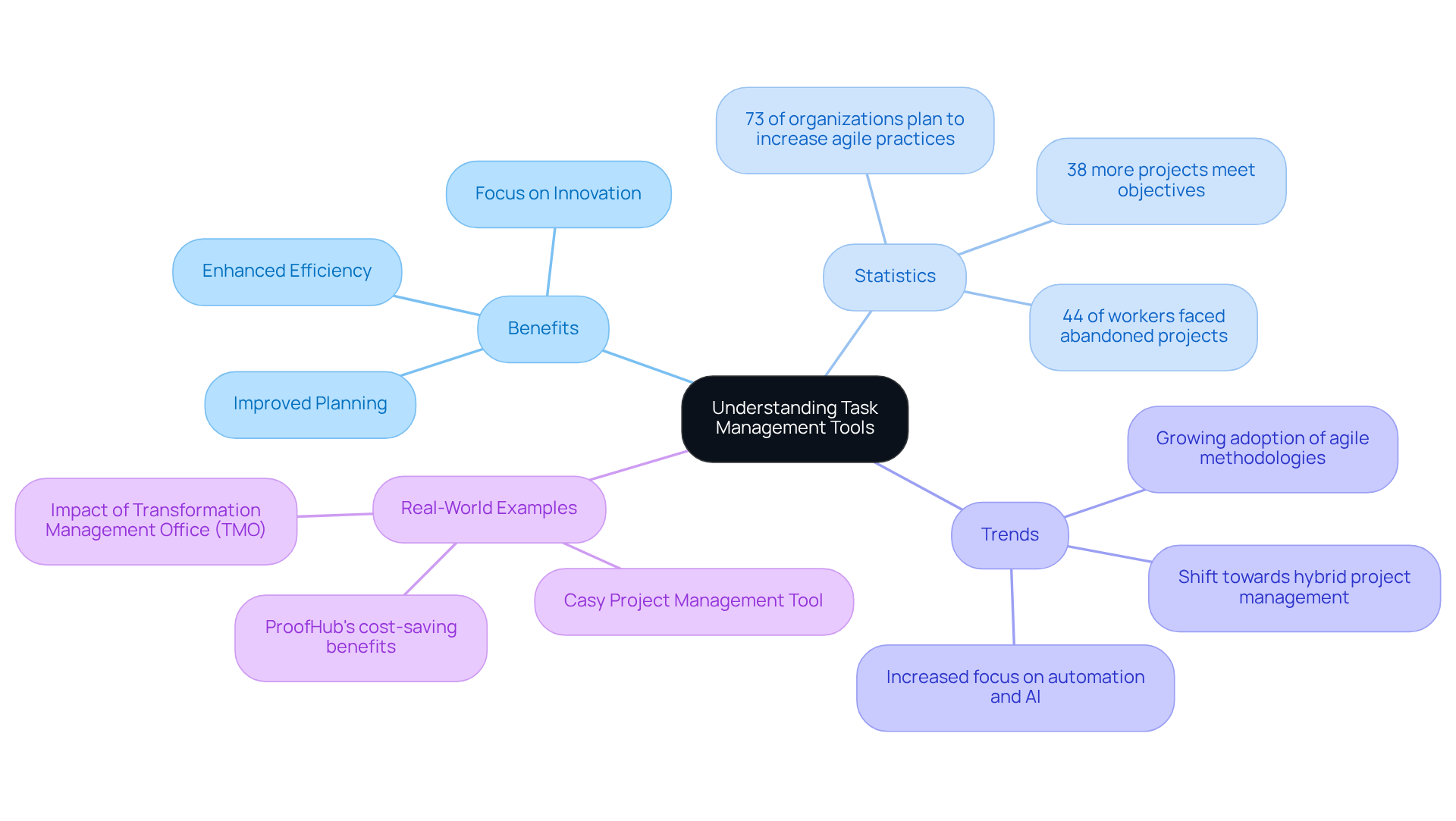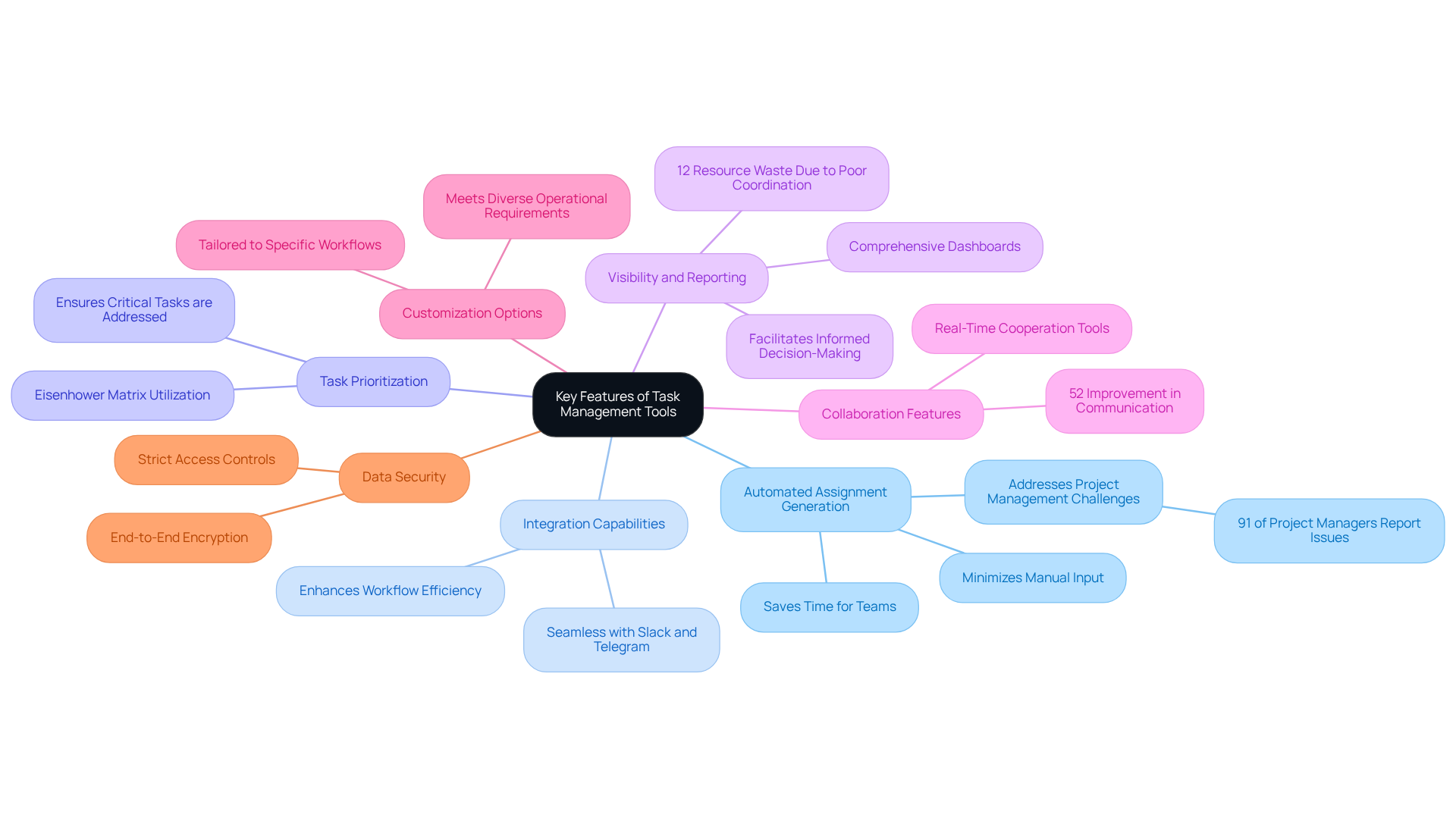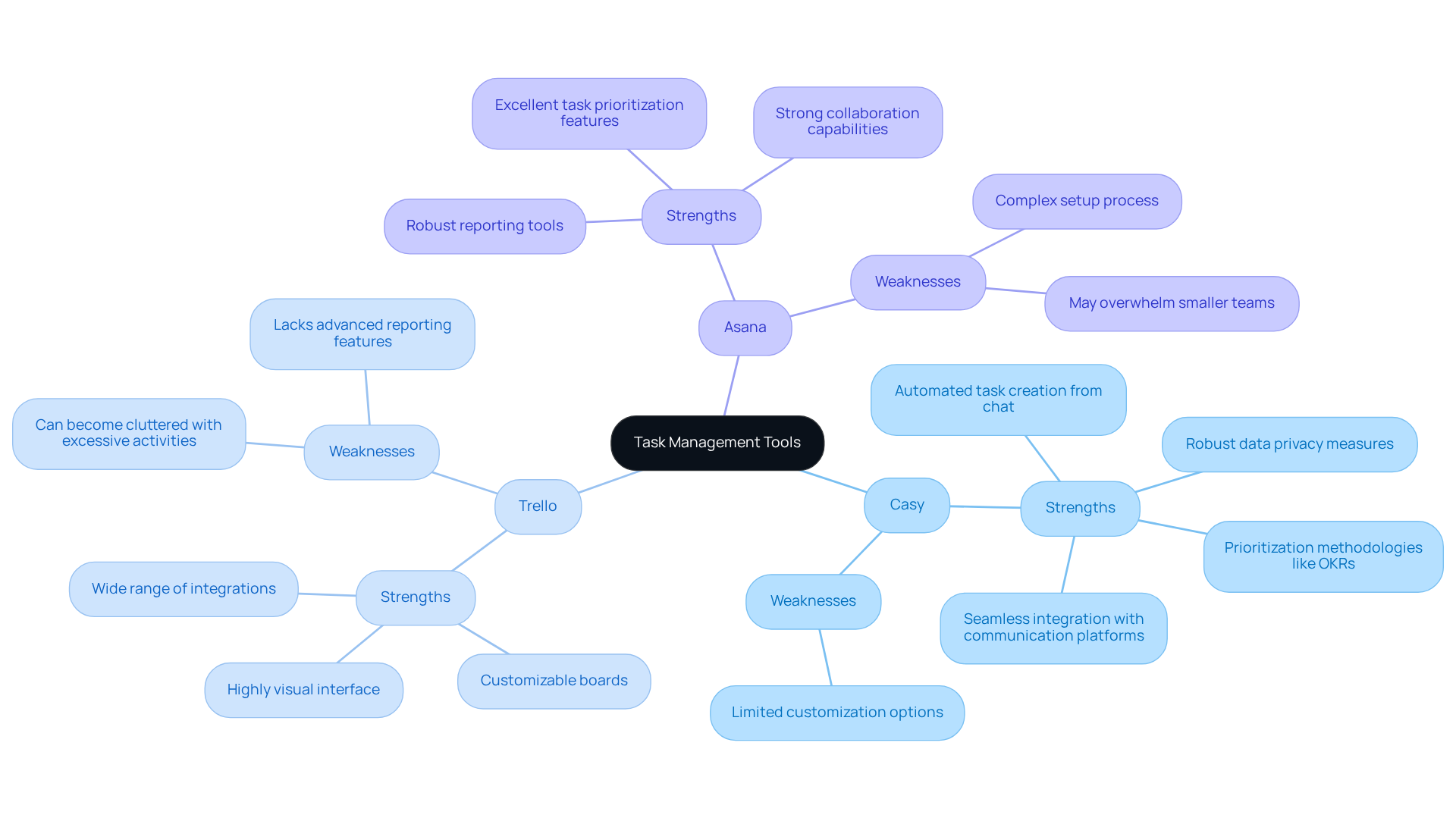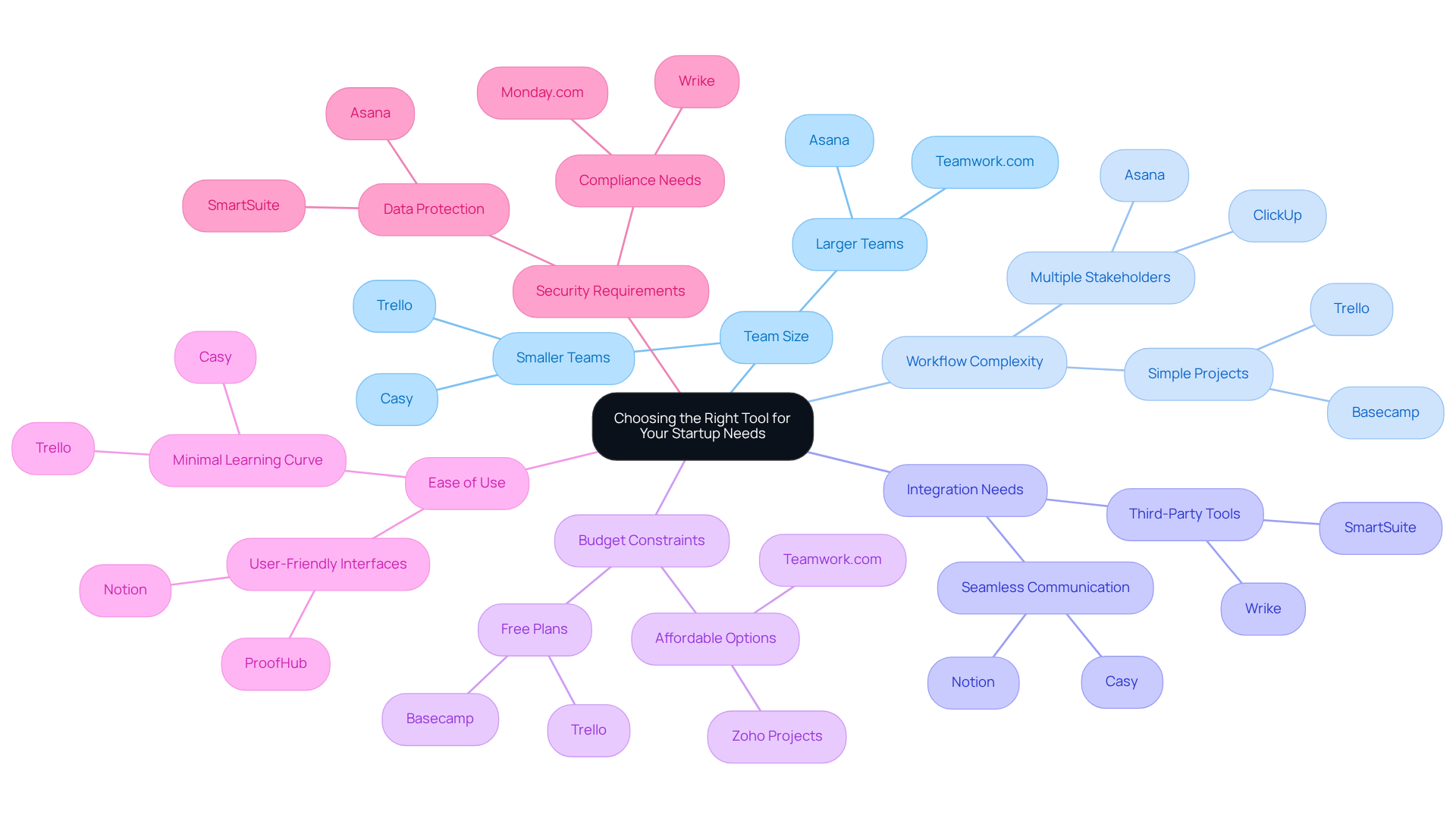Overview
This article identifies the best task management tools for startups, highlighting key features while comparing popular options. It underscores the critical role these tools play in enhancing productivity and ensuring project success. Statistics reveal that effective task management practices can lead to significantly higher project completion rates and reduce operational burdens.
Are you ready to elevate your startup's efficiency? Discover how the right tools can transform your project management approach.
Introduction
Navigating the complexities of startup management requires more than mere ambition; it demands effective organization and streamlined workflows. Task management tools have emerged as essential allies in this endeavor, empowering startups to coordinate tasks, prioritize projects, and track progress within a centralized platform. Yet, with a plethora of options available, how can startups discern which tools will genuinely enhance their productivity and foster innovation? This article explores the best task management solutions for startups, examining their key features, comparative strengths, and the critical factors to consider when making a selection.
Understanding Task Management Tools
For startups, the best task management is achieved through essential task coordination applications that provide a centralized platform for organizing, prioritizing, and efficiently tracking work. These tools facilitate the development, allocation, and supervision of activities, ensuring alignment with project objectives. Given that 44% of workers have encountered multiple abandoned projects due to poor planning, startups—often operating with limited resources—confront significant challenges in effective project management. The need for the best task management is paramount in startup environments where minimizing operational overhead is crucial. By automating repetitive tasks and offering insights into project progress, the best task management tools empower teams to focus on critical initiatives, thereby enhancing efficiency and fostering creativity.
Recent trends indicate a growing adoption of agile methodologies and hybrid project solutions, with 73% of organizations planning to increase their utilization of such practices in the next five years. This shift underscores the importance of adaptability in managing responsibilities, particularly for startups navigating rapid changes. Statistics reveal that organizations employing the best task management practices alongside structured project oversight methods achieve 38% more projects meeting their initial objectives, highlighting the efficacy of these tools in enhancing productivity.
Real-world examples illustrate the impact of project organization resources on startup efficiency. For instance, organizations that implement the best task management tools often report significant reductions in administrative burdens, allowing teams to focus on innovation rather than being bogged down by repetitive tasks. As the project oversight software market is projected to grow from $4.45 billion in 2024 to $5.14 billion in 2025, startups are increasingly recognizing the importance of the best task management solutions in streamlining workflows and optimizing resource allocation.
In conclusion, understanding the various categories of project coordination resources available—from simple to complex systems—enables startups to select the best task management solution that fits their unique requirements and workflows. With 82% of employees viewing project leaders as crucial for successful project execution, the integration of effective organizational resources is vital for startups aiming to enhance productivity and achieve their goals.

Key Features of Task Management Tools
When evaluating task management tools, several key features demand your attention:
-
Automated Assignment Generation: Tools like Casy excel in automatically producing assignments from discussions, significantly minimizing manual input and conserving valuable time for groups. This becomes particularly important when considering that 91% of project managers observe challenges in managing activities within their organizations.
-
Integration Capabilities: Smooth integration with existing platforms such as Slack and Telegram is essential for sustaining effective workflows and enhancing group collaboration.
-
Task Prioritization: Features like the Eisenhower Matrix enable groups to rank activities effectively, ensuring that crucial tasks are addressed swiftly and efficiently.
-
Visibility and Reporting: Comprehensive dashboards and reporting systems provide insights into project progress and group performance, facilitating informed decision-making. Notably, organizations waste nearly 12% of their resources due to ineffective task coordination, underscoring the need for efficient solutions.
-
Collaboration Features: Real-time cooperation resources enhance interaction among group members, promoting collaboration and reducing misunderstandings. Research shows that groups utilizing project management software report a 52% improvement in communication and transparency.
-
Customization Options: The ability to tailor the tool to specific workflows is crucial for diverse groups, ensuring that the tool meets distinct operational requirements.
-
Data Security: Protecting user data through encryption and strict access controls is vital for maintaining confidentiality and fostering trust within teams.
These features not only simplify project coordination processes but also contribute to enhanced productivity and effectiveness, particularly for startups navigating the complexities of best task management. As Peter Drucker emphasized, efficient time organization is essential for project success, making these resources indispensable.

Comparative Analysis of Top Task Management Tools
In this comparative analysis, we will examine three popular project management tools that represent the best task management options: Casy, Trello, and Asana.
Casy offers a compelling solution for fast-moving teams. Its strengths lie in:
- Automated task creation from chat
- Seamless integration with communication platforms
- Prioritization methodologies like OKRs
- Robust data privacy measures
However, it does have limited customization options compared to some competitors. Casy is best suited for teams that require minimal setup and prefer automation.
Trello stands out with its highly visual interface and customizable boards, making it an excellent choice for teams that excel in visual project management. It offers a wide range of integrations, yet it can become cluttered with excessive activities and lacks advanced reporting features. Trello is ideal for teams that need flexibility in organizing their activities.
Asana is known for its robust reporting tools and excellent task prioritization features, making it a strong contender for larger groups. Its collaboration capabilities are noteworthy, although the setup process can be complex and may overwhelm smaller teams. Asana is best for those who require detailed project tracking and reporting.
Each tool has its unique strengths and weaknesses, which can be leveraged for the best task management to suit different team dynamics and project needs. Consider your team's specific challenges and preferences when selecting the right project management tool.

Choosing the Right Tool for Your Startup Needs
Selecting the best task management solution for your startup is crucial and requires a thorough evaluation of your team's specific needs and workflows. Consider the following factors:
- Team Size: Smaller teams may find simpler tools like Casy or Trello advantageous, while larger teams often need the advanced features offered by Asana.
- Workflow Complexity: For projects involving multiple stakeholders that demand meticulous tracking, opt for solutions with robust reporting capabilities.
- Integration Needs: It's essential that the application can seamlessly connect with your existing communication platforms to optimize processes.
- Budget Constraints: Review the pricing models of each resource to identify one that aligns with your startup's financial parameters.
- Ease of Use: A user-friendly interface can significantly minimize the learning curve and enhance team adoption.
- Security Requirements: Startups handling sensitive information should prioritize tools that offer comprehensive data protection measures.
By thoughtfully considering these factors, startups can select the best task management tool that not only addresses their current requirements but also scales effectively as they grow.

Conclusion
Selecting the most effective task management tools is essential for startups striving to optimize their workflows and enhance productivity. The right tools not only streamline project coordination but also empower teams to focus on innovation and meet their objectives efficiently. By understanding the unique features and functionalities of various task management solutions, startups can make informed decisions that align with their specific needs.
Key features such as:
- Automated assignment generation
- Integration capabilities
- Task prioritization
- Data security
are critical components of effective task management tools. The comparative analysis of Casy, Trello, and Asana illustrates how different tools cater to diverse team dynamics, emphasizing the importance of aligning the chosen tool with the startup's size, workflow complexity, and budget constraints.
Ultimately, integrating the best task management tools can significantly impact a startup's success. By prioritizing effective project management practices, startups can reduce administrative burdens and foster a culture of collaboration and creativity. As the landscape of task management continues to evolve, embracing these tools will be vital for startups aiming to thrive in a competitive environment.
Frequently Asked Questions
What are task management tools and why are they important for startups?
Task management tools are applications that provide a centralized platform for organizing, prioritizing, and tracking work. They are crucial for startups as they help in coordinating tasks, ensuring alignment with project objectives, and minimizing operational overhead, which is essential given the limited resources many startups face.
How do task management tools improve project outcomes?
By automating repetitive tasks and providing insights into project progress, task management tools enable teams to focus on critical initiatives. Organizations that use these tools effectively achieve 38% more projects that meet their initial objectives, thereby enhancing productivity.
What trends are influencing the adoption of task management tools?
There is a growing adoption of agile methodologies and hybrid project solutions, with 73% of organizations planning to increase their use of such practices in the next five years. This trend emphasizes the need for adaptability in managing responsibilities, particularly for startups.
What benefits do startups experience from using task management tools?
Startups that implement effective task management tools often report significant reductions in administrative burdens, allowing teams to concentrate on innovation rather than repetitive tasks. This leads to improved efficiency and better resource allocation.
What is the projected growth of the project oversight software market?
The project oversight software market is projected to grow from $4.45 billion in 2024 to $5.14 billion in 2025, indicating an increasing recognition of the importance of task management solutions among startups.
How can startups choose the right task management solution?
Startups should understand the various categories of project coordination resources available—from simple to complex systems—to select the best task management solution that fits their unique requirements and workflows.
What role do project leaders play in successful project execution?
82% of employees view project leaders as crucial for successful project execution, highlighting the importance of integrating effective organizational resources to enhance productivity and achieve goals in startups.




